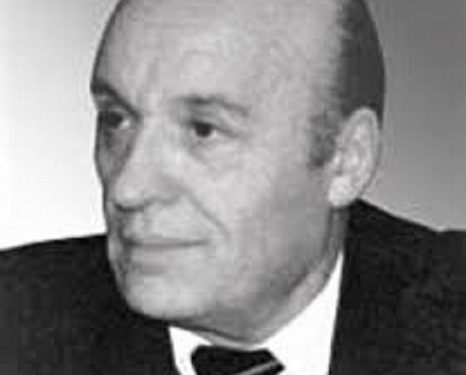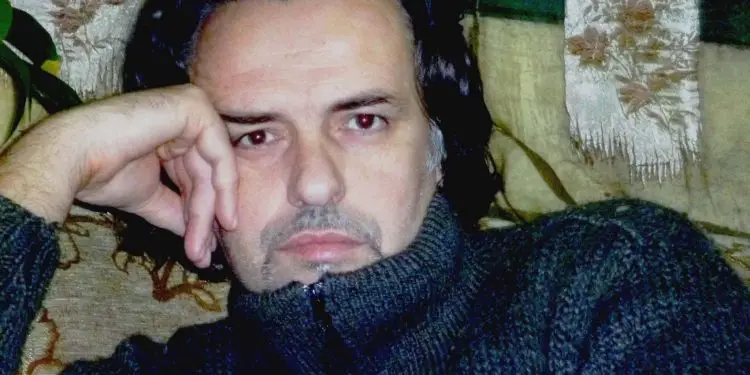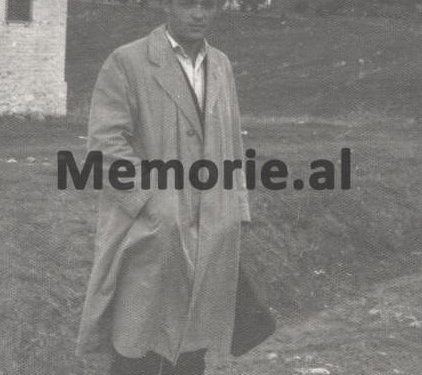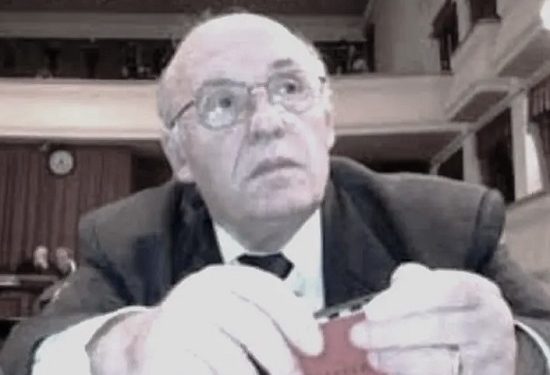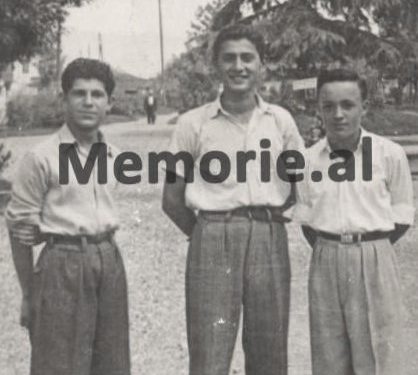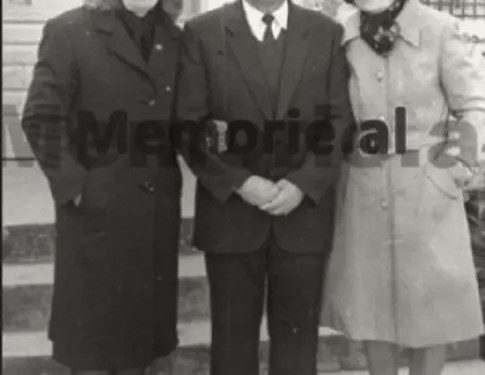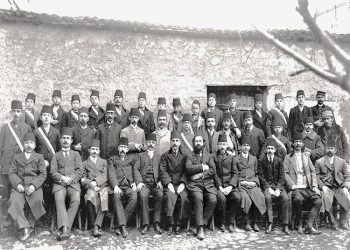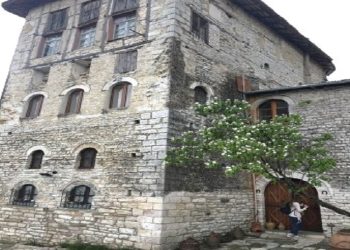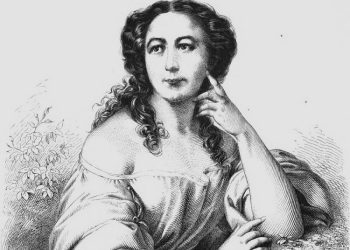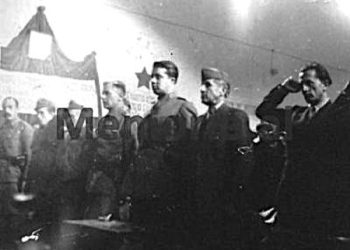By Albert Vataj
Memorie.al / A short man, with his head lowered, as if counting the steps he took, passed the main entrance of the three-story building; he would deliver a greeting that took shape through the voice that resonated from the rasp of a pacifying timbre, the theatricality of his hand and the smile that was written with great purity, in his portrait. He would whisper those light steps in the corridors of the Democratic Party headquarters, to be exhausted by the sight in the corners where he wandered to his office, the dim light. This was the updated ritual of the politician, democrat, founder and leader of the DP, Pjetër Arbnori.
And while we try to outline through a vague memory the portrait of this incomparable man, this nobleman who came and went out among us like a torch, this resistant intellectual, this pen of dissident thought, this courageous spirit and delicate heart, except for a humble gratitude, nothing else is of any use. As he came, he left, to remain, not a Saint Peter, but a disciple of his.
He is perhaps one of the only politicians who came and left without receiving any privilege or favor, without asking or complaining. Everyone loved and respected him, and this was not offered to them as a privilege, but as a merit, because he knew how to be honest and impartial and that was enough for him to be good until the end, because he was not defiled and did not make pacts with the devil.
On January 18, 1935, Pjetër Arbnori was born in Durrës, to die at the age of 71 on July 8, 2006, in a clinic in Naples, after an impossible challenge with his heart, which stopped short of stopping him from continuing, after a cerebral hemorrhage.
In Pjetër Arbnori, the Democratic Party embodied its wise, determined, distinguished leader and founder; Albanian letters instilled in him one of the most vocal knights of dissidence; Albanian society, the great humanist, the fellow sufferer, the symbol of resistance and sacrifice of the superhuman, the “Mandela” of the Balkans.
Pjetër Arbnori, despite all this, remains steadfast as a worthy representative of Albanian literature, that literature written under conditions of terror. He will remain an icon of the new history of Albanian pluralism, representative and spokesperson of the most oppressed stratum of Albanians during the 50 years of dictatorship.
As a politician, he shaped a dignified figure in the turbulent Albanian politics, worthy of respect for his balance, tolerance and self-restraint, which to this day remains unique in the memory of the generation. As a deputy of the first political constellation of the 1990s, he was and remained until the end part of the liberal-democratic philosophy, with a pronounced social spirit.
While, as Speaker of the Parliament, legislator, he will remain in everyone’s memory, as a personality that reminds one of the most brilliant Albanian state-forming figures.
As long as he lived, he managed to fill his arduous Golgotha with a high density of message, with the most beautiful image of a will to freedom. In this long ordeal that meandered through the darkest recesses of communist hell and the monstrous floods of lava of victory, he remained spiritually redeemed.
From the beginning to the end, Pjetër Arbnori was able to bring to life a zealous and passionate political activity, a creator full of refinement and enlightenment, an honest and wise man. He lived his tragic fate without ever complaining and without begging for honors and favors.
The journey of a leader
Pjetër Arbnor’s journey as a leader of action and thought, of voice and voice began when he was 14 years old, an age when it is said that he was involved in illegal groups of the time. Two and a half years of studies at the Faculty of Philology and his excellent results clearly define his scholarly ambitions. Then, he took on his young shoulders the heavy burden of creating a social-democratic organization, the program of which he drafted himself.
From here, his tragic fate was written in red ink. In 1961, he was arrested and sentenced to death for agitation and propaganda. After some time, his sentence was reduced to 25 years in prison. As a result of his activity behind bars and under the yoke, his sentence was increased by ten years, for agitation and propaganda. In August 1989, he was released, having served 28 and a half years in prison in the notorious prisons of the communist dictatorship.
He participated in the early days of the anti-communist movement in Shkodra, which dates back 35 years, on January 14, 1990, when the concrete torso of the dictator was laid on the ground. That struggle with communism, which was writhing in agony, marks the first sparks of the flame of freedom in the northern city. He was in the founding group and was elected chairman of the DP branch for Shkodra during the period 1991-1992.
His political activity is enriched by the trust in the will of the sovereign, the election of deputy in the period 1991-2001, the culmination of which is the duty of the speaker of the Albanian Parliament, April 6, 1992- July 24, 1997. Throughout this entire period, Pjetër Arbnori demonstrated the highest values of a contemporary politician. He was distinguished as a rare person for his sense of humor and prudence, tolerance and wisdom.
Honors and recognitions
Throughout his 71 years of life, Pjetër Arbnori has been honored with the titles; “Teacher of the People”, “Torch of Democracy”, “Honorary Citizen” of the city of Vau i Dejës. Also, the Parliamentary Assembly of French-speaking countries has awarded him the title “Grand Officer of the Order of the Pleiades”.
The President of the Republic of Kosovo, Ibrahim Rugova, has awarded him the silver medallion, “Mother Teresa” and the gold medallion “Georgus Castriotus-Scanderbeg” on 27.11.1996. The Cambridge Biographical Institute and the American Biographical Institute have included Pjetër Arbnori’s biography in the “Who is Who” of intellectuals and in the International Biographical Dictionary, edition 26-27.
He received the 20th Century Medal for Merit. The Cultural Academy, Rome awarded him the “Scodrinon” medal and diploma in 2001. He was decorated (posthumously) with the Order “Honor of the Nation” on 28.10.2011 by the President of the Republic, Bamir Topi, with the motivation: “To the outstanding personality of Shkodra and all of Albania, the symbol of superhuman sacrifices under communist persecution, the peaceful politician and talented writer, the visionary intellectual and the noble citizen, who dedicated his entire life and activity to the great ideals of democracy, the rule of law and national progress”.
The creative gallery of Arbnor the writer
The profile of this personality would be incomplete if it were not announced what constitutes the gallery of literary creativity of Pjetër Arbnor, which although he would list as secondary, after politics, remains the most essential activity. The essence of that creative spirit is preserved for its uniqueness in the secret diary: “The Struggle to Remain Human”, which he was able to keep away from the flames of hell and the nightmare of the cells for 28 years.
The publishing activity extended in the time-sequence 1992-2000, starting with; “When the Vikings Amass”, novella, 1992, to continue with the novel “The Medieval Mountains”, 1993; the novel “Beauty with the Shadow”, 1994; “The White and the Black” novel, 1995; “The Unknown” – The Death of “Goebbels” novella, 1996; “The Half-Away House”, novel 1997; for which Pjetër Arbnor was given ten years in prison. His creative column is enriched by: Novel “Vorbulla”, 1997; “Letter from Prison”, “From Life in Communist Prisons”, historical studies 1992; “Brighton, a Faraway Lightning”, novel 2000; “The Struggle to Remain a Man” – interviews 1990-2000 and “Andre Morua, History of England”, translation 1996.
This humus of renewal of literary and communication values is further layered with; “10300 days and nights in communist prisons”, 2003, (published in Albanian and English); “The New Martyrs in Albania – i nuovi Martiri in Albania”, 2004, (published in Albanian and Italian); “The New Martyrs in Albania – The New Martyrs in Albania”, 2004, published in Albanian and English). To conclude this selfless work with translations; Andrea Morua “History of England”, 1998; William Shirer “The Rise and Fall of the Third Reich” in two volumes, translated in prison, in 1988.
On the day of farewell, Dritëro Agolli states that the value of Pjetër Arbnor, who served 28 years in prison during the dictatorship, lies primarily in his human values. Although he had an extremely difficult life, he never measured people by the yardstick of party affiliation, but by their human and moral values. Pjetër Arbnor is the writer and the figure of the intellectual’s survival, in difficult times. It is truly impossible to separate his figure as a writer, with that of a humane and gentle man. He was and remains such, that day and today. We remember him and express our deepest gratitude for everything he did.
Epilogue
Today, all those who have been deeply missed by the absence of this personality, but especially his wife and two children, remember him. Arbnori, returning through this “In memoriam”, is in the consciousness of politics the regret for the oblivion with which they punished him. But the name and work of Pjetër Arbnori will remain forever in the memory of those who dare even today to believe in the ideals to which he gave himself with body and soul. Because he believed in values as in the individual qualities that dignify the country in representation and memory. Memorie.al




